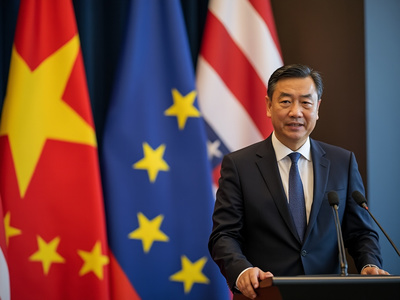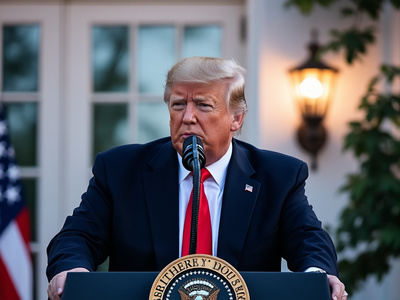
Trump Threatens China with Additional Tariffs Amidst Heightened Trade Tensions
The U.S. President warns of a 50% tariff on Chinese imports if retaliatory measures are not retracted by April 8, 2025.
On April 7, 2025, U.S. President Donald Trump announced potential additional tariffs of 50% on imports from China, should Beijing fail to retract a recent retaliatory tariff of 34% imposed on American goods.
This warning was disseminated via Trump's social media platform, Truth Social, where he also stated that all conversations scheduled with China regarding trade would be suspended, while negotiations with other countries would proceed.
The context of Trump's announcement stems from a series of escalating tariff measures between the United States and China.
Last week, Trump had already instituted a tariff of 34% on Chinese products, on top of a previously announced 20% tariff, bringing the total tariffs on Chinese imports to 54%.
In response, China announced its own tariffs, further igniting the trade conflict.
Experts and analysts have expressed concerns that the ongoing trade war could lead to inflationary pressures in the U.S. economy.
Jerome Powell, Chairman of the Federal Reserve, previously noted the potential for increased inflation and a slowdown in economic growth attributed to the tariff increases.
Meanwhile, the U.S. stock markets reacted sharply to the trade disputes, with major indices such as the Dow Jones and S&P 500 experiencing significant declines.
Wall Street has faced three consecutive days of losses, marking the worst drop since 1987, as traders reacted to the uncertainty surrounding Trump's tariff strategy and the broader implications for the global economy.
Trump maintained that tariffs are a necessary tool to rectify trade deficits with China and the European Union, describing them as ‘beautiful’ and the only remedy for longstanding trade abuses.
Despite calls from industry investors for a pause in these trade actions to prevent further market declines, Trump has reiterated his commitment to his trade agenda.
China's government has rejected Trump's claims and labeled his tariffs as unilateral measures that threaten the global economic framework.
This latest round of tariffs has drawn widespread criticism, with several international stakeholders warning of the potential for recession if these trade practices continue unabated.
The European Union has also emerged as a critical player in this scenario, with discussions among member states regarding how to respond effectively to the trade tensions initiated by the U.S. A meeting of EU commerce ministers is set to address these retaliatory measures and the potential for multilateral negotiations to restore stable trade relations.
In separate developments, Trump announced recent communications with Japanese Prime Minister Shigeru Ishiba regarding future tariff negotiations, further indicating that the U.S. administration is seeking to recalibrate its trading relationships globally.
Markets across the world have struggled to cope with the implications of the escalating trade standoff, with Asian markets experiencing notable losses, including a 7.83% drop in the Nikkei index.
As financial markets react to the continuous volley of tariff threats and the pressure of retaliatory measures, global economic stability remains in a precarious position.
This warning was disseminated via Trump's social media platform, Truth Social, where he also stated that all conversations scheduled with China regarding trade would be suspended, while negotiations with other countries would proceed.
The context of Trump's announcement stems from a series of escalating tariff measures between the United States and China.
Last week, Trump had already instituted a tariff of 34% on Chinese products, on top of a previously announced 20% tariff, bringing the total tariffs on Chinese imports to 54%.
In response, China announced its own tariffs, further igniting the trade conflict.
Experts and analysts have expressed concerns that the ongoing trade war could lead to inflationary pressures in the U.S. economy.
Jerome Powell, Chairman of the Federal Reserve, previously noted the potential for increased inflation and a slowdown in economic growth attributed to the tariff increases.
Meanwhile, the U.S. stock markets reacted sharply to the trade disputes, with major indices such as the Dow Jones and S&P 500 experiencing significant declines.
Wall Street has faced three consecutive days of losses, marking the worst drop since 1987, as traders reacted to the uncertainty surrounding Trump's tariff strategy and the broader implications for the global economy.
Trump maintained that tariffs are a necessary tool to rectify trade deficits with China and the European Union, describing them as ‘beautiful’ and the only remedy for longstanding trade abuses.
Despite calls from industry investors for a pause in these trade actions to prevent further market declines, Trump has reiterated his commitment to his trade agenda.
China's government has rejected Trump's claims and labeled his tariffs as unilateral measures that threaten the global economic framework.
This latest round of tariffs has drawn widespread criticism, with several international stakeholders warning of the potential for recession if these trade practices continue unabated.
The European Union has also emerged as a critical player in this scenario, with discussions among member states regarding how to respond effectively to the trade tensions initiated by the U.S. A meeting of EU commerce ministers is set to address these retaliatory measures and the potential for multilateral negotiations to restore stable trade relations.
In separate developments, Trump announced recent communications with Japanese Prime Minister Shigeru Ishiba regarding future tariff negotiations, further indicating that the U.S. administration is seeking to recalibrate its trading relationships globally.
Markets across the world have struggled to cope with the implications of the escalating trade standoff, with Asian markets experiencing notable losses, including a 7.83% drop in the Nikkei index.
As financial markets react to the continuous volley of tariff threats and the pressure of retaliatory measures, global economic stability remains in a precarious position.
Translation:
Translated by AI
AI Disclaimer: An advanced artificial intelligence (AI) system generated the content of this page on its own. This innovative technology conducts extensive research from a variety of reliable sources, performs rigorous fact-checking and verification, cleans up and balances biased or manipulated content, and presents a minimal factual summary that is just enough yet essential for you to function as an informed and educated citizen. Please keep in mind, however, that this system is an evolving technology, and as a result, the article may contain accidental inaccuracies or errors. We urge you to help us improve our site by reporting any inaccuracies you find using the "Contact Us" link at the bottom of this page. Your helpful feedback helps us improve our system and deliver more precise content. When you find an article of interest here, please look for the full and extensive coverage of this topic in traditional news sources, as they are written by professional journalists that we try to support, not replace. We appreciate your understanding and assistance.











